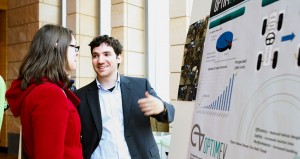Want to open your own business just like current SBE student Scott Ramage? Interested in being your own boss? Come learn more about the B.S. in Management with a concentration in Entrepreneurship!
Can’t wait to see you there!
Want to open your own business just like current SBE student Scott Ramage? Interested in being your own boss? Come learn more about the B.S. in Management with a concentration in Entrepreneurship!
Can’t wait to see you there!
Are you still unsure about what major to choose? Do you want to add something to your existing Management degree? Are you looking to add a second major? Come learn about Supply Chain and Operations Management!
Can’t wait to see you there!
Scott Ramage has just a few months left until he graduates with a Bachelor of Science in Operations and Systems Management from the School of Business and Economics, but that didn’t stop him from celebrating the opening of his new business on February 5. This unique venture is called 906 Vapor, and is an electronic cigarette lounge and vapor bar.
What is an electronic cigarette? Often referred to as an e-cigarette, this personal vaporizer often looks much like an “old-fashioned” cigarette with an LED light on the end. Using one of these satisfies nicotine cravings without most of the chemicals and carcinogens known to typical tobacco products.
Where did Scott find the inspiration to become an entrepreneur before even graduating? He says that he owes some of his success to his dedicated personality, persistence, and of course, the classes he’s taken as part of his undergraduate career at Michigan Tech! The idea for 906 Vapor originally began as a homework assignment for Scott’s Management of Technology and Innovation (MGT 4600) course. His professor, Andre Laplume, encouraged him to keep thinking about ways to make the business into a reality. Scott also drew inspiration from Michele Loughead’s business courses, as well as BUS 2300: Quantitative Problem Solving, taught by Roger Woods.
After graduation, Scott plans to continue his success with 906 Vapor while furthering his education. Perhaps he may even be interested in pursuing his MBA through the School of Business and Economics!
For all of SBE’s young entrepreneurs, Scott offers some advice: “If you have an idea and you believe it will work, take the chance and give it all you have. Even if you fail, keep trying. The experience and knowledge gained can never be taken away from you. It can only benefit you in your future endeavors.”
Do you have an idea for a new business venture? Or have you recently started your own business? Tell us all about it in the comments!

A new statewide entrepreneurial contest aims to arm students with the resources and skills necessary to launch a successful tech start-up in the state of Michigan. In addition to more than $100,000 in award money, the Michigan Collegiate Innovation Prize (MCIP) offered participants intensive start-up training based on the National Science Foundation’s Innovation Corps program.
Michigan Tech fielded a team out of a project for the Business Development Experience course — one of four required for the Entrepreneurship Concentration.

The Michigan Tech students who participated were:
The challenge kicked off in late October with a two-day workshop and culminated in February with a final showcase and awards ceremony. During the intervening four months, participants attended biweekly online progress meetings and received pitch training, mentorship and up to $2,000 in prototype funding. Teams were encouraged to brainstorm and innovate on their business model and position in the market.
90 teams participated in the first round and 29 made it on to the finals. Applicants were evaluated based on:
The Michigan Tech Team mentored by Professor Entrepreneurship and Innovation Dr. Saurav Pathak, Instructor Jonathan Leinonen, and Senior Lecturer in Accounting Anne Warrington was one of the teams selected to advance to the finals. Their project was to develop a low cost ventilator for infants in Ghana. This is an International Business Venture project out of the Enterprise program. The Michigan Tech team went on to win a $2,000 grant to further develop their product.
Event coordinators say the statewide venture challenge will help both the state and its students by keeping Michigan relevant in the knowledge economy and creating different career paths for college graduates.

All graduate (Masters and PhD) students must submit a Commencement Application form ten (10) weeks prior to commencement.
All undergraduate students must submit an online Graduation Application. This form should be filled out two (2) semesters before graduation. The form needs to be filled out by all prospective graduates—including those who will not be participating in the ceremony. A separate application is required for each undergraduate degree.
Prospective graduates’ names will be added to the online commencement list weekly.
Spring Commencement is 10:30 am on Saturday, May 3, 2014 in the SDC Ice Arena.
Mid-year Commencement is 10:30 am on Saturday, December 20, 2014 in the SDC Wood Gym.
Both the SDC Ice Arena and Wood Gym are alcohol-free facilities.
Yes, tickets are required for the ceremony. For the spring ceremony, students will receive four (4) tickets each. For the mid-year (December) ceremony, students will receive five (5) tickets each. Children who will be sitting on an adult’s lap will not need a ticket.
They are free! Under no circumstances should tickets be bought or sold.
For the Saturday, May 3 ceremony, tickets can be picked up between the hours of 8:30 am and 4:30 pm beginning Monday, April 21 through Thursday, May 1, at the Customer Service Center in the Campus Bookstore. There is open seating for the audience.
Any unclaimed tickets or those students who need extra tickets may pick them up from the Central Ticket Office at the SDC, starting the day before the ceremony, Friday, May 2. They will be distributed on a first-come, first-serve basis.
Graduate students should contact Nancy Byers Sprague, nspr@mtu.edu or 906-487-2755.
Undergraduate students who wish to participate in an earlier commencement ceremony must get permission from the Degree Services Office, degree@mtu.edu.
Graduate students should contact Nancy Byers Sprague, nspr@mtu.edu or 906-487-2755.
Undergraduate students can walk at their expected graduation ceremony or any thereafter – make sure the correct degree completion term and ceremony term are on your Graduation Application.
Students participating in the fall commencement should plan to attend Gradfest on Wednesday, February 26, 2014 from 2-5 pm at the Campus Bookstore in the MUB. Undergraduate students can order their caps and gowns online. Graduate students will need to place their order for rental garb by Sunday, March 2. Orders placed after this date will incur additional shipping fees and cannot be guaranteed.
Students participating in the Fall Commencement 2014 will order their caps and gowns beginning in October 2014.
If you are not able to attend Gradfest, please contact the Campus Bookstore at 906-487-2410 or capandgown@mtu.edu to order.
Students who wish to purchase extra tassels may do so for $5.50 from the Campus Store.
Yes! Caps and gowns are required to participate in commencement.
ROTC commissionees are dressed in uniform and do not wear caps and gowns.
Honor cords represent outstanding academic achievement and are provided by the University. The Campus Bookstore will have a list of those who qualify for honor cords. Honor cords designations are based on overall GPA accumulated prior to the graduating semester and are determined by the Registrar’s Office: Summa Cum Laude (3.90 and above) designated by a gold cord, Magna Cum Laude (3.70-3.89) designated by a silver cord, and Cum Laude (3.50-3.69) designated by a copper cord.
Honor cords are available for pick-up at the Campus Store with your cap and gown.
Graduate students can pick up their caps and gowns at the Campus Store in the MUB between 8:00 am and 4:30 pm beginning Monday, April 28 through Friday, May 2.
Undergraduate students can order their caps and gowns online, beginning Wednesday, February 5.
Graduation announcements can be purchased directly from Balfour.
Commencement rehearsal is on Friday, May 2 at 1:30 pm. Undergraduate students line up in the SDC Multi-purpose room. Graduate students line up in the multi-purpose room. Signs will be posted by department and then your name. Simply find your department and get in line.
Rehearsal lasts approximately 1 hour.
All prospective graduates participating in the ceremony should arrive no later than 9:45 am on Saturday, May 3.
The exact time depends on the number of graduates, but usually the mid-year commencement ceremony lasts approximately 2 hours. The spring commencement ceremony lasts approximately 2 ½ hours.
The doors to the SDC Ice Arena and the SDC Wood Gym will be open by 8:30 am on the day of the ceremony.
Arrangements have been made with a professional photographer to take a photo of each degree candidate as he or she is congratulated on stage. Ordering information will be mailed to your home address or emailed within 4-6 weeks. Please make certain that your current home address is on file with the Registrar’s Office.
Yes, but we ask that they remain seated during the ceremony. We discourage guests from disrupting the ceremony.
Special needs seating is available for guests and family members. Should special seating accommodations be required, please contact Emily Walikinen in the Registrar’s Office, 906-487-2319 or emilyw@mtu.edu by Friday, April 25. Space for wheelchairs will be provided; however, Michigan Tech is unable to provide wheelchairs.
A Signer will be present throughout the ceremony to assist the hearing impaired.
Your guest will need a general admission ticket to get in, but does not receive a special needs ticket. Please pick up your tickets from the Campus Bookstore, prior to the ceremony.
The person with special needs does not have to sit alone. Your entire party, up to a maximum of 5, may sit together in the special needs section.
Yes.
Yes, the Alumni Association invites all graduates and their families to the SDC Multi-purpose room for the Graduates Reception taking place directly after the commencement ceremony. There will be light refreshments as well as areas set aside for taking photos. Stop by and sign your class of 2014 banner and pick up your Michigan Tech Alumni Association pin.
Spring Commencement Brunch—May 3, 2014. The Michigan Tech Dining Services will be offering a commencement brunch from 1–2:30 pm in the Memorial Union Isle Royale Ballroom for graduates and their families.
There is no brunch for the Mid-Year Commencement ceremony in December.
Diplomas will be mailed 60-90 days after the end of the semester that all degree requirements have been successfully completed provided all financial obligations to the University have been met. Diplomas are mailed to the address noted on the Graduation Application. Changes to this address must be made with the Degree Services Office. A $30 processing fee will be assessed for diplomas that have to be reordered due to an incorrect address.
If you are not attending a commencement ceremony and you would like a cover for your diploma, please stop by the Student Service Center in the Administration Building to pick yours up prior to leaving campus.
NOTE: Diploma covers will not be mailed.
Graduates sitting on the left hand side will wear the tassel on the left and graduates sitting on the right hand side wear the tassel on the right. Michigan Tech asks graduates to wear their tassels like this so the photographer will have a clear opening to take your picture.
Purses, diaper bags, cameras and video equipment bags will be allowed into the ceremony. Please be aware that Public Safety and Police Services will be on hand to check bags.